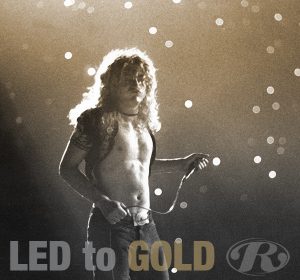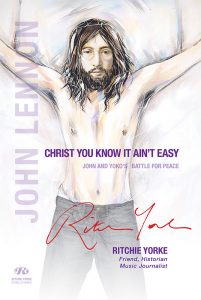10 Apr Led Zeppelin Profile Robert Plant

Continuing four-part series on Led Zeppelin, I turned to lead singer Robert Plant, who is regarded in some quarters as rock’s most provocative sex symbol since Jim Morrison (but wait till you hear what he has to say about that!).
RY: DID YOU EXPECT TO MEET WITH SUCH STAGGERING SUCCESS?
RP: Never! I don’t think anyone could expect that really. Not even Jimmy, and Jimmy already knew that American audiences were much more responsive to hard work. But none of us really expected this. Just band! And we really never knew how big we were.
You can’t really realize it until you come to each individual town that you have never been in before and people are running down the street banging on your car windows and all that. And when you get a fantastic reception the moment you walk on stage, you start to realize just what’s happening. I could never have dreamed of anything like this.
RY: WHAT WERE YOU DOING BEFORE LED ZEPPELIN WAS FORMED?
RP: I was working immediately before LZ with a group called Alexis Korner and we were in the process of recording an album with a pianist called Steve Miller, a very fluid thing – nothing definitely set up. We were going to do a few festivals in Germany and that sort of thing. Before that, I hadn’t dome much at all. I’d cut three singles which I prefer to forget. I want to leave them in the dimmest past!
John Bonhm and I worked together for a total of about 2 1/2 years. It was a period of trying to find what I wanted to do musically. You know, you go through the initial thing where you want to get up on stage and scream your head off, and the next minute you want to play blues and you finally find that everything is a means to an end to what you really want to do musically… once you’ve reached it.
So I feel my first four or five years were finding out what I wanted to do. You could either end up going completely into the pop field on a commercial trip, or just stick to what you liked musically.
RY: HAVE YOU NOW FOUND YOURE MUSICAL NICHE?
RP: I think I’m finding it. The first year of LZ has made me see a lot more of what I want to do. I think this year has been much more valuable to me than the other five because for the first five years nobody really wanted to accept what I was doing, even though we were doing a sort of Buffalo Springfield – Moby Grape sort of thing.
In England, nobody really wanted to know, they just said it was noise with no meaning; and to me, it was the only noise with meaning. The Springfield and the Grape really knew what they were doing.
LZ has given me a chance to express that in lyrics on the second album and when we do the third album I hope to get that thing even more to the point of what I’m trying to get into. Gradually, bit by bi, I’m finding myself now. It’s taken a long time, a lot of insecurity and nerves and the “I’m a failure” stuff. Everybody goes through it. Even Jimmy did, when he was with the Yardbirds, but now everything’s shaping up nicely.
RY: WHEN YOU STARTED THOUGH, EVERYONE IN NORTH AMERICA THOUGHT THIS WAS JIMMY PAGE’S BAND. THAT WAS THE IMPETUS WHICH LAUNCHED YOU HERE. IT MUST HAVE MEANT YOU ALL HAD A GREAT RESPONSIBILITY TO PROVE YOURSELVES INDIVUALLY, AS BOTH PEOPLE AND MUSICIANS.
RP: Yeah, but it was really good, because, well, obviously we owed a lot to Jimmy in the first place because, without him, we couldn’t have gone into the right places initially… Because people like Spooky Tooth have had such a hard time trying to get any sort of reputation in the States, and eventually all their inspiration goes.
Spooky Tooth came over here in the summer and did about seven gigs in as many weeks. It was very bad for the band.
With Jimmy’s reputation, we could go into the proper clubs, but had Jimmy been the only member of LZ who was any good at all, it would have been pointless. Fortunately each of us shone in our own little way, if that’s what you can call it, and the audiences said: “Wow, there’s Jimmy and he’s brilliant” and they look around and they take everybody else how they want to.
Obviously on the first tour, it was all Jimmy, Jimmy, Jimmy, which is fair enough because he deserved it, and then on the second tour people started taking an interest in the other members of the group and then with our stage act, well we’ve had some criticism of that.
The thing is that after a while you personally start going out on the stage and you can feel what’s going to happen. The moment you set foot on stage you can sort of let go, and the audience is like a piece of blotting paper and what makes it is what you give it, and you’ve gotta give it good.
Each of us has a different personality which comes to the fore. Like John, when he jumps into the air above his drums. Everybody now knows each member of the group for his musical ability and for himself, I think.
RY: ROBERT, YOU HAVE BEEN DESCRIED AS THE MOST IMPORTANT NEW SEX SYMBOL IN POP SINCE MORRISON. DOES THIS REALLY GET TO YOU? OR DO YOU TAKE IT LIGHTHEARTEDLY?
RP: Yeah, well, don’t you think it’s the end of you life once you take it seriously, that sex symbol thing. If any musician goes on stage feeling that; I mean, you can take in all that applause at face value and it can turn you into a bad person, really it can.
TERRIBLE HARM
All this sort of popularity can do you terrible harm and I treally thought that it would do once we started getting off. I though, “God, if this keeps going what the hell will happen to me?”
You can go right off your rocker and you can start to think – “Here I am and I’m the greatest singer in the world” and all that. But it’s not worth doing that because there’s always someone who can come along and will sing better than me and I fully realize that. So all you can be is honest and be yourself.
If there’s some nights when I don’t want to say anything to the audience then I don’t. But I don’t make it noticeable.
I don’t really know how people think about sex symbols. If they can see your pelvis then that must make you a sex symbol… because I’m the only one of us that doesn’t have a guitar or drums in the way of mine. I suppose I started with a bit more chance than anybody else in the band.
You can’t take it seriously simply because you read all these things about it. You just get into your music and the sexual bit isn’t an apparent thing. It’s not what we’re there for.
RY: YOUR STAGE ACT SEEMS TO BE GOING THROUGH SOME CHANGES, AS COMPARED WITH THE FIRST COUPLE OF TOURS.
RP: Yeah. I think that what we’re doing now is what each one of us wants to do. I think people expect us to be a lot more arrogant than we are. A lot of people say “Yeah well they’re alright but what about all that laughing and jumping around they do.”
There seems to be a label that goes with music that’s intense. People are expected to stand there looking as through they’re out of their minds. If ever I was to go out of my mind, I’m sure I wouldn’t just stand there like that – so it’s like a big play act and we mustn’t play otherwise we’ll run away with ourselves like Jim Morrison did.
RY: DO YOU THINK MORRISON TAKES HIMSELF TOO SERIOUSLY?
RP: Oh yeah. We only played with the Doors once in Seattle and it seemed like he was screwed up. He was giving the impression he was into really deep things like Skip Spence of Moby Grape. You can get into a trip of your own that you don’t really realise what’s going on in the outside world.
Morrison went on stage and said “Fuck you all” which didn’t really do anything except make a few girls scream. Then he hung on the side of the stage and nearly toppled into the audience and did all those things that I suppose were originally sexual things but as he got fatter and dirtier and more screwed up, they became bizarre.
So it was really sickening to watch. My wife and I were there watching and we couldn’t believe it. I respected the Door’s albums, even though they’re not brilliant musicians, and, as I said, that doesn’t matter. What Morrison was doing on record was good.
Over all our heads
The tracks “Cancel My Subscription To The Resurrection” was great, but now he doesn’t get into any of the things from the past, and the sexual thing has gone. He was just miles above everyone’s head. It seemed that he realized the Doors were on the way down.
He went on stage with that opinion and immediately started saying all those strange things which nobody could get into. There were one or two people there crying: “You’re God, you’re King,” and I was thinking, “Why?”
Then the Youngbloods went on stage and wiped the audience out because they were so warm. They’d laugh and the audience would laugh. That’s how music should be. It isn’t a real serious thing. We’re not over here to have a bad time. We’re over here to have a good time and people pay money to have a good time as well.
RY: BUT THERE HAS TO BE SOMETHING ELSE GOING DOWN. JIMMY AND I AGREED ON A THEORY ABOUT A GAP IN THE SCENE FOR HARD ROCK.
RP: You could say that and then again you couldn’t. There was such a difference, even on first hearing, between us and the Cream. There was an intense difference. Thrtr were other groups in the country at the time who could have filled the Cream’s place more specifically than ourselves.
RY: BUT YOU’RE INTO HARD?
Different things
RP: Well, I think individually, off stage, we’re into different things but it all comes out in the music. If you noticed, we had a C&W half hour the other night.
RY: THERE SEEMS TO BE A LOT OF YOUNGER KIDS TURNING UP TO YOUR CONCERTS?
RP: Yeah, the spreading of the gospel I suppose! It beats me why they come. I really think that the first album wasn’t commercial at all. You know, CS&N are for more commercial than LZ. In as much as the vocal thing is there to hand on to. With LZ there was all sorts of different things going on. Every member of the group was doing something different so it doesn’t strike you immediately as something…
RY: OBVIOUSLY YOU DID WHAT YOU WANTED AND THE PUBLIC LIKED IT AT THE SAME TIME?
RPL Yeah, that’s why I can’t see why the kids that came along got into it as strongly as we did and as strongly as the original audiences who came to see us when we first came over here. So you’ve got this stronger thing now. The audiences are really strange now. It worries me sometimes to see how it’s turning out. Go to concerts by Janis or the Youngbloods or Neil Young and you’ll still get the same people. So I suppose the audience is just fanning out more and more.
RY: YOU MADE IT IN AMERICA FIRST AND THEN BRITAIN. THIS HAS GOT A FEW PEOPLE UPTIGHT?
RP: Yeah, it has. You can imagine that England being the conservative place it is, the conservatism foes into the music as well. The musical journalists are still sort of dubious about this sort of music and they were thinking that it was a flash in the pan and they didn’t think it had any social relevance which it does.
Groups who go on stage and play music at festivals that says: “Down with the establishment” are immediately in the majority now – even in England.
RY: WHO ARE YOUR GREATEST INFLUENCE:
RP: There was a guy called tommy McClellan, who recorded on the Bluebird label for RCA in the 30s. His rapport, the way he completely expressed himself on record, was great ‘cause it was though he was saying “To hell with you,” all the time, and he was just shouting out all these lyrics with such gusto that even now, you could sit there and go “Corr.”
It’s the same with Robert Johnson. His sympathy with his guitar playing, it’s just like when you’ve a vocalist you have to be sympathetic with the musicians you’re playing with.
RY: B.B. KING?
RP: Not really. I like B.B. I like to listen to him, I like to hear him sing and I like him stalking and leading up to things like “Don’t Answer The Door,” where he does a big rap like that Isaac Hayes album, where he does a big thing for a long time. But B.B. King is a guitarist’s sort of singer really if anybody is sort of going to take things from him.
I always respected Steve Winwood I must admit. He was to me the only guy. He had such a range in the early days when Spencer Davis first became popular. They were doing things like “Don’t Start Crying Now” By Slim Harpo and “Watch Your Step” and “Rambling Rose,” Jerry Lee Lewis, and the whole way. Steven was one of the first people who wasn’t sticking to the normal, like the Hollies and all those groups who had been “dot dash, dot dash, follow the lines” and sang all the same thing every night.
And along came little Winwood, who was only a bit older than me, and started screaming out all these things and I though, “Gosh, that’s what I’ve been trying to do.”
RY: WHAT DO YOU THINK OF JOHN PAUL JONES?
RP: What a question! As a musician, incredible. His imagination as bass player is very good. Also as a pianist and organist, because he looks at the whole thing in a completely different way to me. I mean, the five lines and four spaces were never of any importance to me because I was a vocalist and I just hung onto the fact that it was an easy way out being a vocalist. You don’t have to know much, you just have to sing.
He comes from a different angle all together and even though it doesn’t apply to my singing he can be a definite influence on the group – if he cares he can be which is an interesting thing. Jimmy can read music and all that, but he’s more basic, more into blues and whamming out and writing the sort of thing I want to write, but John comes in and his rhythms and his whole thing from Stax and soul side of things, they give you the backbeat that you need so I appreciate that.
RY: BONZO?
RP: He’s a good sparring partner? (Laughs). We played together for a long time and I think this is the only band we’ve ever had, obviously, any success in. If I didn’t like him as a drummer I suppose he wouldn’t have been the drummer, because someone would have said no. So he’s got to be all right. Besides, he’s phone his missus in the morning to send a bunch of flowers to my wife.
RY: Jimmy?
RP: To begin with, when someone comes along and says: “Come with us; you’re going to make a lot of money,” you think he’s got to be joking, so you say okay. But in the beginning I held myself a long way off from him. The more you get into the bloke, although he seems to be quite shy, he’s not really. He’s got lots of good ideas for songwriting and he’s proved to be a really nice guy.


